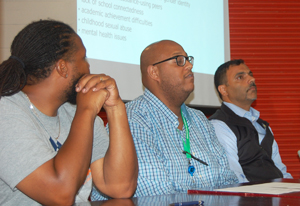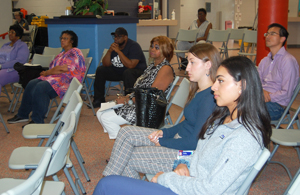
By Tricia Hall
The Truth Reporter
The University of Toledo Medical Center (UTMC) launched a series of outreach sessions to raise awareness and remove the stigma from substance usage. The first session was held on Wednesday, July 26 at the historic Frederick Douglass Community Association located at 1001 Indiana Avenue in Toledo.
The sessions were funded by a grant from the Ohio Commission on Minority Health to organize educational events in northwest Ohio that would raise awareness about substance abuse and prevention in Black/African American and Hispanic/Latino communities.
“Substance abuse can begin with prescription medication, progress to the misuse of the prescription and overtime the patient is unable to manage or monitor the pain or usage. That could lead to attempting to monitor in a different way if the medication becomes unavailable,” said Jeremy Miller, M.S.W., LISW-S, LIDC-CS, guest speaker.
The discussion incorporated short videos and charts that introduced visual examples of the subject matter. According to one chart labeled the demographic summary of unintentional drug overdose deaths in Ohio from 2016-2021. All age groups from under the age of 15 to 65+, both female and male, and also all reported race and ethnicity groups saw a steady increase from 2016 to 2021. Female reported deaths were 1,284 in 2016 and rose to 1,572 in 2021. Male reported deaths were 2,766 in 2016 and rose to 3,602 in 2021.
“Many people dealing with substance abuse just want to stop, but we have to provide an environment where they are listened to. No one wants to deal with the withdrawal symptoms. It’s not easy and not everyone made the choice to take opioids,” shared Miller.
The stages of changes are defined as the following:
- Precontemplation, being unaware of or refusing to acknowledge risks.
- Contemplation, beginning to consider a change and weighing the costs and benefits.
- Preparation, deciding on and planning for a change in behavior.
- Action, implementing a plan to change and beginning a new behavior.
- Maintenance, reinforcing and making a habit of a new behavior.
 “There are different stages of change precontemplation, contemplation, preparation, action and maintenance. In the precontemplation stage we should listen to understand and be present, in the contemplation stage, there’s where you gather the resources, in the preparation stage that’s where you deliver the resources that were previously gathered, in the action stage that’s where you give support to support their change and in the maintenance stage that’s where their change is acknowledged,” said Miller
“There are different stages of change precontemplation, contemplation, preparation, action and maintenance. In the precontemplation stage we should listen to understand and be present, in the contemplation stage, there’s where you gather the resources, in the preparation stage that’s where you deliver the resources that were previously gathered, in the action stage that’s where you give support to support their change and in the maintenance stage that’s where their change is acknowledged,” said Miller
One of the charts displayed the number of unintentional drug overdose deaths involving Fentanyl, Psychostimulants, Benzodiazepines, Cocaine, Heroin and Natural/Semi-Synthetic Opioids between 2016 to 2021. The number one drug is Fentanyl, there were 2,000+ reported deaths in 2016 and in 2021 over 4,000+. Benzodiazepines and Heroin have trend downward, while Psychostimulants, Heroin and Natural/Semi-Synthetic Opioids have all increased.
“We’re focusing on the beginning tonight, so we can learn to listen without judgement which is important for those suffering from substance abuse. That’s one of the reasons why we are doing these sessions. Substance abuse is a condition that needs therapy and support,” said Mohamad Moussa, Ph.D, associate professor at UTMC and session organizer.
The session concluded by addressing questions from the audience.
The additional session information: Wednesday, August 9 will focus on treatment resources that are available in the community with guest speaker Renee Craft, Wednesday, August 23 will focus on spotting substance use and the risk factors in adolescents with guest speaker Sharon Thomas and August 30 will focus on Covid-19 effects on behavioral health and substance use with guest speaker Victoria Kelly. All sessions will begin at 6:00 p.m. and held at the Frederick Douglass Community Center and was organized by a team led by Mohamad Moussa, Ph.D an associate professor at UTMC.
Local substance abuse resources:
- NAMI Greater Toledo, https://namitoledo.org/, 419-243-1119
- Mental Health & Recovery Services Board of Lucas County list of providers, https://www.lcmhrsb.oh.gov/service-providers/
- 24/7 CrisisCare Line, 419-904-CARE (2273)
